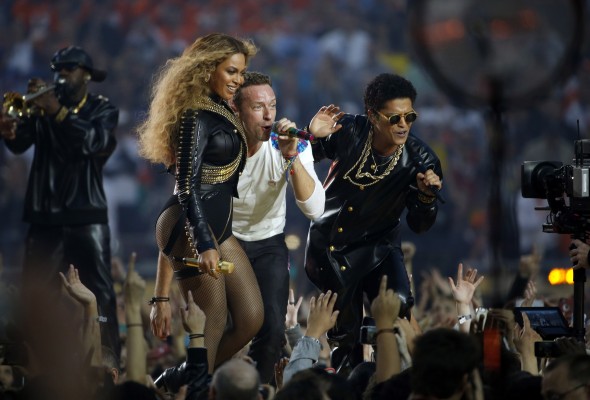Beyonce Rocks the Nation with a New “Formation”
TNS
Beyonce, left, sings with Chris Martin of Coldplay and Bruno Mars, right, during the halftime show at Super Bowl 50 at Levi’s Stadium in Santa Clara, Calif., on Sunday, Feb. 7, 2016. (Nhat V. Meyer/Bay Area News Group/TNS)
February 25, 2016
With the release of Beyoncé’s new music video, “Formation”, the queen herself has been able to get the nation talking about the issues that have arisen within the past few years, namely regarding racial discrimination as a whole, police brutality and the stake it has in the broad spectrum of racism, and the individual pride of being Black and African American and heralding the truth, that #BlackLivesMatter. In the video, Bey sings about various nuances related to her heritage, her family and her success. With lyrics like, “My daddy Alabama, Momma Louisiana, You mix that negro with that Creole make a Texas bama,” she describes her own culture growing up and sings it, unabashed. With many other instances throughout the song that clearly demonstrate the pride of being a country girl from Texas despite her fame, she is able to use the song to champion pride for her background in times where many are forced to feel ashamed.
The opportune release of “Formation” just in time for Black History Month was no mistake. Numerous harrowing events have occurred to intensify the Black struggle, and to make its proud people feel alienated, victimized and underrepresented. Like the police brutality against black men like Eric Garner and Michael Brown, the profiling and death of Trayvon Martin, and even farther back when the devastating storm Hurricane Katrina hit New Orleans, where criticisms of the relief efforts strike accordingly with classism and racism as well, the suffering has become outstanding. Yet while these events proved terrible and destructive in the grand scheme of the quest for equality, Beyoncé does a beautifully artistic job of highlighting the perseverance and resilience of black people and their activism.
One of the most notable scenes in Bey’s new video is towards the end of the video, where there is a young black boy in a hoodie and jeans dancing in front of a line of white police officers in riot gear. What defines this scene as powerful is when the young boy lifts his arms up and out to shoulder’s length, and the police officers are the ones with their hands up in surrender. This speaks volumes to the numerous incidents of intentional police brutality towards multiple black individuals, and the scene demonstrates a very interesting dynamic. Here, the power and influence is placed in the hands of a young black boy, who in society would not normally have that power, or at least would have it taken away from him and used against him. Contributing writer to Mashable, Savonne Anderson, does a great job of explaining this strategic move, as well as multiple other scenes used in the music video to portray some sort of political meaning.
Another notable scene in the music video is when the camera focuses on her daughter, Blue Ivy, and talks about Beyoncé’s love for her “baby heir with baby hair and afros.” Interestingly enough, natural hair has often become the topic of many political debates, especially with young women who actually decide to rock the ‘locs.’ One notable individual is Zendaya, who suffered backlash from the cast of The Fashion Police for claiming that she probably smelled like patchouli. However, Zendaya was able to respond beautifully, in a way that likens ‘locs’ to that of a powerful lioness, and to stand up for what her culture stood for. As a comparison, in “Formation,” one of Beyoncé’s outfits can be seen corresponding with dreads.
As we reflect back on the steps that numerous powerful black leaders took to make strides towards equality, “Formation” highlights a number of those things with pride and beauty, capitalizing on the strength of black culture, black people and black pride. With Beyoncé sending a clear message about where she came from and why she is still proud to be the woman that she is today, it’s time for us to listen up and get in formation to see the change that all black people have worked hard to create, and just as hard to promote.










